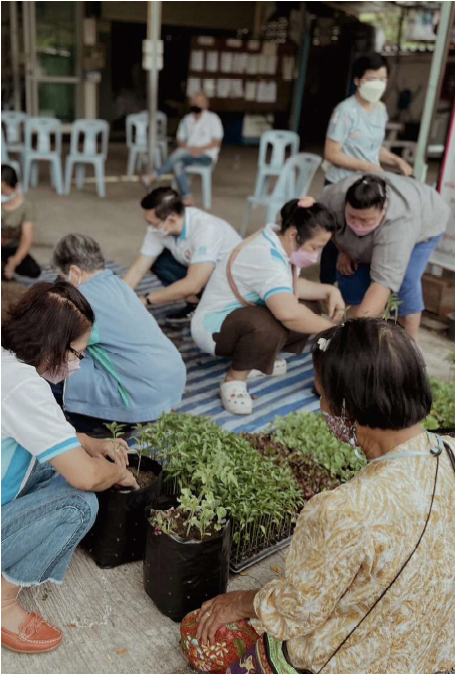ประชาสังคม: ทรัพยากรการเรียนรู้ชุมชนเพื่อการสร้างกลไก เมืองแห่งการเรียนรู้
Main Article Content
บทคัดย่อ
การสร้างกลไกความร่วมมือและการขับเคลื่อนเมืองแห่งการเรียนรู้ ภายใต้ชุดโครงการวิจัยโครงข่ายท้องถิ่นกับการเรียนรู้เมืองเชียงใหม่ในกรอบเครือข่ายเมืองแห่งการเรียนรู้ของ UNESCO Institute for Lifelong Learning โดยมีวัตถุประสงค์เพื่อการค้นหาระบุทรัพยากรเมืองแห่งการเรียนรู้ระดับชุมชน การสร้างกลไกความร่วมมือของภาคประชาสังคมเก่า-ใหม่ในเมือง อันนำไปสู่การขับเคลื่อนเมืองแห่งการเรียนรู้ ผ่านการศึกษาวิเคราะห์ทรัพยากรและนิเวศการเรียนรู้ของเมืองเชียงใหม่ในพื้นที่ 3 ชุมชน ประกอบด้วย ชุมชนควรค่าม้า ชุมชนป่าห้า และชุมชนช้างม่อย ร่วมกับการดำเนินการพัฒนากลไกความร่วมมือระหว่างภาคส่วนต่าง ๆ โดยการวิจัยเชิงปฏิบัติการพบภาคประชาสังคม จำนวน 4 กลุ่ม ในการสร้างให้เกิดกระบวนการความร่วมมือระดับท้องถิ่น ผ่านทรัพยากรที่เกี่ยวข้องกับเนื้อหาของท้องถิ่น กิจกรรมการศึกษาท้องถิ่น และการสร้างฐานข้อมูลองค์ความรู้แบบข้ามภาคส่วนระหว่างชุมชน ภาคประชาสังคมเก่า-ใหม่ เยาวชน และหน่วยงานท้องถิ่น อันนำไปสู่การพัฒนาเครือข่ายกลไกเมืองแห่งการเรียนรู้ ภายใต้กรอบเมืองแห่งการเรียนรู้ โดยการสำรวจและระบุทรัพยากรเพื่อการเรียนรู้ เผยให้เห็นสถานการณ์ของทรัพยากรเมืองที่สำคัญกำลังลดลงตามกาลเวลา ประเมินได้จากเงื่อนไขและความสำคัญต่อชุมชนที่มุ่งประเด็นสำคัญเฉพาะกลุ่ม กล่าวคือ ส่วนใหญ่ผู้ที่ยังเห็นคุณค่าและรักษาสภาพทรัพยากรเหล่านั้นเป็นกลุ่มผู้สูงอายุ ซึ่งมีกำลังถดถอยในการส่งต่อทรัพยากรที่สำคัญต่อการเรียนรู้และขาดการเชื่อมต่อกับคนรุ่นใหม่โดยเฉพาะในพื้นที่ชุมชน ส่งผลกระทบต่อนิเวศการเรียนรู้ที่มีความสำคัญลดลงตามกาลเวลา ด้วยเหตุนี้จึงจำเป็นต้องมีกระบวนการเสริมความสามารถชุมชนจากการสร้างกลไกการเรียนรู้ให้สมบูรณ์ และเชื่อมต่อการสร้างความร่วมมือใหม่ ๆ ระหว่างภาคประชาสังคมรุ่นใหม่ให้เข้ามามีส่วนร่วมกับการทำงานเชิงพื้นที่เมืองมากยิ่งขึ้น
Article Details

อนุญาตภายใต้เงื่อนไข Creative Commons Attribution-NonCommercial-NoDerivatives 4.0 International License.
เอกสารอ้างอิง
Barth, B., Cruz F.J. & Miguel, A. (2018). Cross-sector collaboration for better social outcomes. Brussel: The European Venture Philanthropy Association.
Child, J., Faulkner, D. & Tallman, S. (2005). Cooperative strategy: managing alliances, networks, and joint ventures. Retrieved May 30, 2022, from https://academic.oup.com/book/2413
Clarke, A. & Crane A. (2018). Cross sector partnerships for systemic change: systematized literature review and agenda for further research. Journal of Business Ethics, 150 (1), 303-313.
Kearns, P. (2015). Learning cities on the move. Australian Journal of Adult Learning, 55(1), 153-168.
Merkel, A. & Seidel, L. (2018). Organizational learning in a cross-sectoral collaboration towards sustainable development. Retrieved April 28, 2021, from https://www.diva-portal.org/smash/get/diva2:1482857/FULLTEXT01.pdf
Osborne M., Kearns, P. & Yang J. (2013). Learning cities: developing inclusive, prosperous and sustainable urban communities. Retrieved April 20, 2022, from https://link.springer.com/content/pdf/10.1007/s11159-013-9384-y.pdf
Parker, J. (2019). Learning cities: experiences, reflections and opportunities. France: World Committee for Lifelong Learning.
Pedersen, E., et al. (2021). Toward collaborative cross-sector business models for sustainability. Business & Society, 60(5), 1039-1058.
UNESCO Institute of Lifelong Learning. (2015). UNESCO global network of learning cities guiding documents. Retrieved April 15, 2022, from https://uil.unesco.org/fileadmin/keydocuments/LifelongLearning/learning-cities/en-unesco-global-network-of-learning-cities-guiding-documents.pdf
Wongkongkaew, S. (2021). Karn pattana krabuankarn phuea khap khluean prachakhom mueang Chiang Mai. (In Thai) [A process for the development of sustainable Chiang Mai]. Retrieved March 20,2022, from https://www.khonthai4-0.net/system/resource/file/kpfgo_content_attach_file_384_1.pdf?date=2022-07-20%2011:00:21.1


